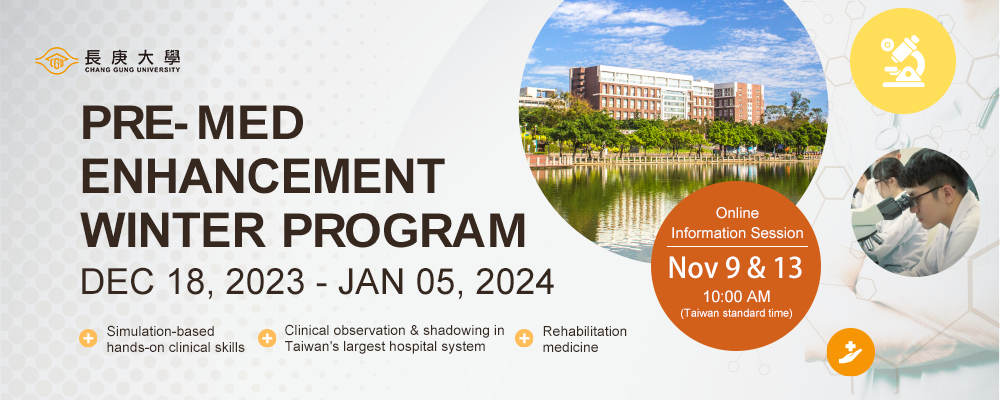2023 Pre-med Enhancement Winter Program

Course period
Add-on module 1: December 11, 2023 – December 15, 2023 (1 week)
Core curriculum: December 18, 2023 – January 5, 2024 (3 weeks)
Add-on module 2: January 8, 2024 – January 12, 2024 (1 week)
(Core-curriculum will be the main study period; Add-on modules are optional, and must be indicated in the application system)
Contents
General design:
General or advanced lectures in biochemistry, microbiology, immunology, and physiology will be provided by the program. Special lectures in AI and Chinese Medicine will also be included in the program. Chinese Medicine courses will also be scheduled in the Add-on module(s).
Course description:
-
Biochemistry (3 hours)This course offers a comprehensive introduction to study in medicine at molecular levels, such as DNA and proteins. The approaches of molecular cloning, genomics and proteomics will be discussed.
-
Microbiology (3 hours)This course provides a fundamental introduction to the major areas of bacteriology, virology, and parasitology. The basic structure, physiology, genetic regulation, and pathogenic mechanisms of bacteria and viruses will be discussed. A general introduction of parasitic infections, including roundworms, flukes, tapeworms, and protozoan, is included.
-
Immunology (3 hours)The lectures will offer the basics of the components and mechanisms of the human immune system. The interplay between the immune system and foreign pathogens and the regulation of the immune responses are included. Finally, immune dysfunctions, hyper-activities, and the clinical applications of the immune reactions will be discussed.
-
Physiology (3 hours)The purpose of this course is to present the basic principles and facts of human physiology in a format which is suitable for premed students. The contents of the course are to explain, integrate, and synthesize information and mechanisms rather than a simple description of the body functions. Students will be guided to obtain knowledge of integrated body functions and the underlying mechanisms. Lectures will be developed from the molecule, cell, tissue, organ, and body as a whole.
-
Chinese Medicine Special Lectures (Total: 9 hours/ Core-curriculum: 3 hours)Experiencing the beauty of Traditional Chinese medicine (TCM): connecting modern to ancient medicine. This course includes three categories of TCM knowledge: Chinese internal medicine and herb (3 hours), acupuncture (3 hours), manual therapy (3 hours). The objective of these courses is to acknowledge the insight of TCM and the integration TCM and western medicine, and the possible management based on TCM theory, including herbal medicine, acupuncture, and manual therapies.
Center for Clinical Skills & Simulation has become an integral part of the curricular requirements in undergraduate education in Chang Gung University and postgraduate training in Chang Gung Memorial Hospital. The center provides adequate equipment and space which can be integrated with students’ medical knowledge, providing learning opportunities with reflection. The center aims to effectively improve students’ basic clinical skills and strengthen their clinical reasoning and collaborative competence of the multiple disciplinary healthcare team by simulation-based educational activities.
Course contents:
-
Introduction to roles of the Center for Clinical Skills & Simulation in Medical Education (3 hours)
- Introduction of the Center for Clinical Skills & Simulation
- Introduction of Simulation-Based Medical Education
- Introduction of the Objective Skills Clinical Examination (OSCE)
-
Ultrasound (1 hours)
- Point of care Ultrasound
-
Clinical skills practice (3 hours)
- Simple Suture
- Casting
- Personal Protective Equipment
-
High-fidelity Simulation & Clinical Reasoning (8 hours)
- Introduction of clinical reasoning
- Simulator for the training of clinical reasoning
The clinical shadowing in the Chang Gung Memorial Hospitals include total of 5 clinical settings across internal medicine, surgery, and rehabilitation medicine. The unique clinical VR/3D printed object demonstration to aid in clinical learning and therapy will also be included in this program.
-
Internal medicine
-
Nephrology
- Overview of kidney physiology and diabetic kidney disease
- Kidney ultrasound
- Hemodialysis and peritoneal dialysis
- Transplant immunology
-
Cardiovascular medicine
- Electrocardiogram reading
- Cardiac ultrasound
- Percutaneous coronary intervention
-
-
Surgery
-
Cardiac and thoracic surgery
- Observation for open heart surgery, ECMO, VATS surgery, and robotic surgery
- Learning for thoracic oncology, Post-operative care of thoracic and cardiovascular patients
-
Plastic and reconstruction surgery
- Principles of Plastic and Reconstructive Surgery
- Microsurgery practice on artificial model, or chicken thigh
- Visiting BURN intensive care unit and learning BURN care
- Ear framework carving mimicking microtia reconstruction
- Hand rehabilitation center round
- Observation of Operation Room and Cosmetic Center
-
-
Rehabilitation medicine
Department of Physical Medicine and Rehabilitation consists of the following services:
- Interventional ultrasound-guided injection treatments
- Prosthetics and orthotics
- Pediatric rehabilitation (early intervention)
- Stroke rehabilitation
- Spinal cord injury rehabilitation
- Geriatric medicine
- Physical therapy
- Occupational therapy
- Speech therapy
- Music therapy
- Art therapy
- Proteomics
- Neural rehabilitation
- Regenerative medicine
Contact person
Academic Contact:
- Dr. Yang Huang-Yu, Director
E: hyyang01@gmail.com - Dr. Chia-Lin Wu, Co-Director
E: clwu@mail.cgu.edu.tw
Administration / Logistics:
Carol Hsia
Administrative Assistant
Office of International Affairs,
Chang Gung University
E: premed@gap.cgu.edu.tw
P: +886-3-2118800#3064





